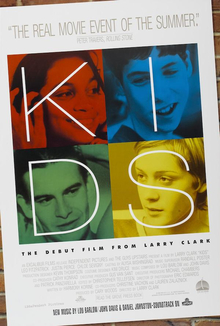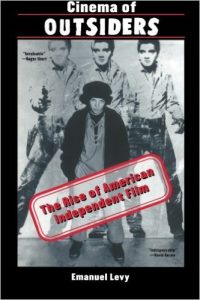Sundance Film Fest, January 1995 (My review was written 3 hours after the screening, and I reprint it here exactly as it was penned back then).
The shrewdly run indie company, Miramax, slipped their scandalous film, Kids, into the Sundance Festival as an unannounced midnight screening, and it immediately became the talk of the festival; in fact, it was the only controversial film in an otherwise disappointing week.
Grade: B- (*** out of *****)
| Kids | |
|---|---|

Theatrical release poster
|
|
Produced by rebel filmmaker Gus Van Sant (To Die For, My Own Private Idaho), the movie marks the impressive directing debut of Larry Clarke, the noted photographer.
The screening’s clandestine nature, combined with Clarke’s penchant for lurid subject matter, created a buzz–and a packed house of viewers, all glued to their seats.
In its candid, bold approach, Kids dwarfs all of Hollywood’s youth movies, crossing new boundaries in its portrayal of sex, drugs, and leisure.

What was so Shocking about Kids?
For starters, real and actual teenagers are playing the roles, not handsome Hollywood actors in their 20s, as was the norm, in such films as Blackboard Jungle, starring Sidney Poitier (playing at age 30 a high school student), or Rebel Without a Cause, with James Dean (then 25), both landmark films made in the same year, 1955.
Then, there’s the question of authenticity: the film feels compellingly realistic, which makes its impact all the more horrible and horrific.
Set on a hot summer day, Kids is structured as a fast-paced chronicle of 24 hours in the lives of a group of Manhattan kids. They hang out on the streets, relentlessly pursuing kicks, smoking pot, guzzling booze, and so on. Parents may not like to acknowledge it, but the kids in this movie are perpetually and dangerously libidinous. Engaging in violence is an integral part of their daily routines. Incidents of gay-baiting and black-bashing are sort of day-to-day occurrences.
The opening scene unflinchingly observes Telly (Leon Fitzpatrick), a perpetually horny, utterly irresponsible 14 year old kid, talking a naive blonde girl (Sarah Hendersen) into the sack.
As soon as the sex is over, the cocky Telly quickly hits the streets in order to boast to his buddies about his conquest; the boast is more gratifying and important than the sexual act itself.
Telly’s monologue about his obsession with virginal girls, and his plan to score another big conquest later hat night, is unsettling, precisely because it’s so compelling and believable.
In the afternoon, the wild kids head for a local pool for some skinny-dipping and more sexual pranks. They finally crash at a friend’s apartment, where they get high and drunk again. Later that night, another virgin is victimized by the same swaggering, careless seducer.
But it’s not just boys talking and scoring. There’s also an ultra-frank session, in which the girls discuss in vivid detail their favorite sexual positions. Jennie (Chloe Sevigny) admits to her friends that she had lost her virginity to Telly, the only guy she has ever slept with.
Basically plotless, Kids depicts never-before-seen acts of adolescent seduction, girls’ fear of losing their virginity, boys’ aggressive need (and anxiety) to score. The epidemic of AIDS is a constant threat. It’s especially shocking when Jennie, one of the least promiscuous girls, is diagnosed HIV-positive, based on a one-time experience!
Curiously, the graphic depictions of the youngsters fucking and drinking make for an upsetting, but also appealing, film. The most startling and disturbing thing about Kids is its ability to sustain a sense of genuine horror but also voyeuristic fascination with “dubious” subject matter. It’s one thing to read about teenage sex in “Time” magazine; it’s quite another to actually view it onscreen.
I wonder how Clarke, a middle-aged man, managed to capture so accurately the values, speech, and sexual urges of his teenage characters. How did he win the trust of his young ensemble? No doubt, he was helped by the fresh screenplay written by 19-year old Harmony Korine, a street kid himself, who shows a gutsy, beyond-the-boundaries sensibility. Still, Clarke deserves credit for his intuitive understanding of youth angst–and burning libido.
Kids offers yet another proof of the vibrancy of the new American independent cinema in tackling difficult issues. Made in the best tradition of cinema verite, this powerful expose might become a cause celebre due to its uncompromising take on kids behavior. It also might become the most controversial film of the year. It remains to be seen what kind of rating Miramax, which is now owned by Disney, is going to get from the MPAA without sacrificing the film’s artistic or moral integrity.
Direct in its observational method, Kids takes a non-judgmental view of contemporary urban youngsters, allowing viewers to make up their own minds about its debatable contents. Boasting hyper pacing and natural, non-actorish performances, Kids makes a strong claim to authenticity.
At the same time, the film walks a fine line between its moral intent as a cautionary tale, warning against the disregard for safe sex, and its undeniable voyeuristic, even exploitative elements. As usual, Miramax’s aggressive publicity machine might benefit from the film’s controversial nature and ambiguous tone.
Cinematographer Eric Edwards, who has worked with Gus Van Sant before, uses a restless, mobile camera to give the picture a striking visual quality and a deceptively improvisatory feeling.
Kids achieves a remarkable feat by being a visually polished film that still feels like a non-fictional work.
Credits:
Directed by Larry Clark
Produced by Cary Woods
Written by Harmony Korine
Music by Lou Barlow, John Davis
Cinematography Eric Edwards
Edited by Christopher Tellefsen
Production companies: Independent Picture, The Guys Upstairs, Killer Films
Shining Excalibur Films, Kids NY Limited
Distributed by Shining
January 20, 1995 (Sundance Film Fest)
May 17, 1995 (Cannes Film Fest)
July 28, 1995 (US)
Running time: 91 minutes
Budget $1.5 million
Box office $20.4 million
Cast
Leo Fitzpatrick as Telly
Justin Pierce as Casper
Chloë Sevigny as Jennie
Rosario Dawson as Ruby
Yakira Peguero as Darcy
Atabey Rodriguez as Misha
Jon Abrahams as Steven
Harold Hunter as Harold
Sajan Bhagat as Paul
Sarah Henderson portrays the first girl Telly is seen having sex with.
Tony Morales and Walter Youngblood portray the homosexual couple.
Julie Stebe-Glorius and Christina Stebe-Glorious appear as Telly’s mother and younger brother, respectively.
The Rastafari is played by an actor credited as “Dr. Henry.”
Screenwriter Harmony Korine has an uncredited appearance as Fidget.












